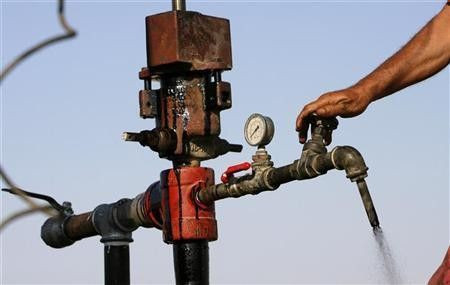Oil Price Rises to $113 on Tension over Iran’s Nuclear Program

(REUTERS) -- Oil rose to around $113 a barrel on Tuesday as tension over Iran's nuclear program and unrest in Nigeria outweighed persistent concerns about the strength of Europe's economy.
Iran has begun enriching uranium deep inside a mountain and has sentenced an American to death for spying, angering the West and undermining expectations that diplomacy could avert further sanctions or even war.
Brent crude rose 65 cents to $113.10 a barrel by 1215 GMT, following a decline of 61 cents on Monday. U.S. crude was up $1.33 to $102.64.
On balance the bulls seem to be winning, despite the strong dollar, weak demand in the Eurozone and a mild winter in the northern hemisphere, said Christopher Bellew, a broker at Jefferies Bache.
The tension over Iran's nuclear program, which Tehran insists is for peaceful purposes, have included threats by Iran to shut the Strait of Hormuz, the world's most important oil export route.
European Union states, which have already agreed in principle to an embargo on Iranian oil to ratchet up pressure on Tehran, are due to hold a meeting to decide on the measure on Jan. 23, EU diplomats said on Monday.
Iran produces 3.5 million barrels per day (bpd) of crude, making it the second-largest producer in the Organization of the Petroleum Exporting Countries after Saudi Arabia. The EU imports about 500,000 bpd from Iran.
Despite demand conditions being relatively weak, oil prices are still above $100 because of the geopolitical tensions. There is a floor on prices at the moment, said Natalie Robertson, an analyst at ANZ.
Supply risks were also in focus in Nigeria, where trade unions began a second day of strikes on Tuesday to protest the removal of fuel subsidies. The strike has so far not affected shipments from Africa's largest oil exporter.
Brent is trading close to its 200-day moving average at $112.70, which remains a key level of technical support, said Olivier Jakob of Petromatrix. First resistance is at $114, where recent rallies have run out of steam.
While threats to supplies supported oil prices, economic weakness in Europe limited gains.
The euro rose on Tuesday after hitting a 16-month low versus the dollar on Monday. Investors remain concerned about the outlook for the region's economy and banks and the prospects for government debt sales.
China's exports and imports grew at their slowest pace in more than two years in December, data showed on Tuesday. Even so, crude imports were up five percent in December year-on-year, and analysts expected steady oil import growth in 2012.
In top oil consumer the U.S., crude stocks were expected to have risen last week by 200,000 barrels, a Reuters poll showed. Industry group the American Petroleum Institute issues its inventory report at 2130 GMT.
© Copyright Thomson Reuters 2024. All rights reserved.




















